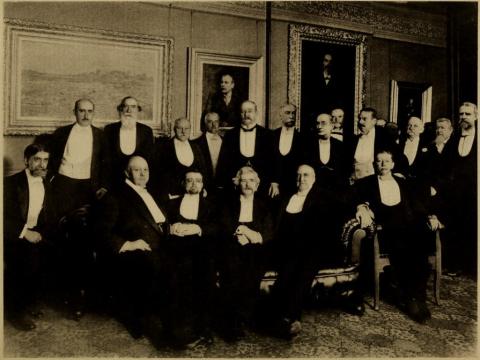November 3-5, 1900: The Clemenses visited with William Dean Howells and Laurence Huttons in Princeton, NJ
From November 10th DBD Entry:
The world does move! Mrs. Clemens & the girls have gone off in a hired mobile to the theatre in Harlem. She & I went to Harlem in a coupe three days ago, with a poor tired horse who made less than 4 miles an hour, & it is a pity for the horse that has converted the woman.
Now then, please tell me where in New York we can send & get a mobile at peace-rates when we need one [MTP].
Note: In 1900 there were only 8,000 autos registered in the entire U.S. and only about ten miles of paved roads. Only 4,000 autos were manufactured in 1900. Ten years later there were 187,000 rolling out of factories. The Automobile Club of America first met on Oct. 16, 1900, and sponsored the first auto show in Madison Square Garden Nov. 3 to10. Still, there was much skepticism about the “devil-wagon.”
See Day By Day Entry for Twain's Guest of Honor appearance at the Lotos Club.
Seated (extreme left): Issac N, Seligman. Seated (extreme right): Thomas Bailey Aldrich. Seated on sofa (left to right): Thomas B. Reed, Frank R. Lawrence, Samuel L. Clemens (Mark Twain), Chauncey M. Depew. Standing (left to right): John Kendrick Bangs, Moncure D, Conway, William Dean Howells, A. F. Southerland, St. Clair McKelway, William Henry White, John Elderkin, William T. Evans, William Wallace Walker, David B, Sickels, George H. Daniels, Horatio N. Fraser.
Sam was again in Princeton on 16, 17th and 18th of November, without his family.
On 7 December, 1900, Mark Twain introduced Winston Churchill at the Waldorf-Astoria, Zwick places this on December 12th (see the DBD Entry for December 12):
“... I think that England sinned when she got herself into a war in South Africa which she could have avoided, just as we have sinned in getting into a similar war in the Philippines. Mr. Churchill by his father is an Englishman; by his mother he is an American; no doubt a blend that makes the perfect man. England and America; yes, we are kin. And now that we are also kin in sin, there is nothing more to be desired. The harmony is complete, the blend is perfect — like Mr. Churchill himself, whom I now have the honor to present to you”
(“Mark Twain as Missionary,” Boston Transcript, 14 December 1900, p.9.) (S&G pages 723-4)
Zwick notes that Churchill “… to his first American audience at the Waldorf Astoria in New York City. ... Churchill supported British Imperialism and his reception in New York was boycotted by many American anti-imperialists. Twain agreed to introduce Churchill but delivered a scathing indictment of imperialism in the process. Before concluding that England and America were “kin in sin” for their respective wars in South Africa and the Philippines, he noted how they were also united when they “both stood timorously by at Port Arthur and wept sweetly and sympathizingly and shone while France and Germany helped Russia to rob the Japanese.” (pages 96-7)
... at the end of the year and the end of the century, Clemens wrote a sardonic “greeting”: “A salutation-speech from the Nineteenth Century to the ‘Twentieth, taken down in short-hand by Mark Twain: I bring you the stately matron named Christendom, returning bedraggled, besmirched and dishonored from pirate-raids in Kiao-Chou, Manchuria, South Africa & the Philippines, with her soul full of meanness, her pocket full of boodle and her mouth full of pious hypocrisies. Give her soap and a towel, but hide the looking-glass” (“New Century Greeting Which Mark Twain Recalled,” New York Herald, 30 December 1900, Section I, p. 7). (Smith & Gibson, V2 page 726)
Zwick (page 159) writes: In just two sentences he blasted four prominent manifestations of the imperial surge that was taking place worldwide at the end of the nineteenth century: Germany’ s seizure of Kiao Chow Bay in China, Russia’s occupation of Manchuria, the Boer War in South Africa, and the Philippine-American War.
Zwick, on page 114, provides a facsimile of the greeting with a final note: “Give her the glass: it may from error free her / When she shall see herself as others see her.
Two weeks later Mark Twain agreed to serve as a vice president of the Anti-Imperialist League of New York.
At the beginning of 1901, in the February North American Review, Mark Twain’s wrath against the recent policies of the Czar in China, of Kaiser Wilhelm and Foreign Secretary Joseph Chamberlain in South Africa, and of President McKinley in the Philippines boiled over again in “To the Person Sitting in Darkness — one of the most powerful pieces of invective he ever wrote. Page 726
The Clemens family celebrated Christmas of 1900 in Elmira, traveling there on the 24th and back in New York City on the 30th.
Sam and Livy planned to travel to Boston and a visit with Thomas Bailey Aldrich and family, returning on Jan. 17 [Jan. 5 to Gurlitz; others]. Note: the trip likely took place, since no outgoing letters are extant from Jan. 14 to 18, and NB entries seem to confirm; Fatout lists a Jan. 16 Boston dinner speech for Sam.
Sam was in Washington D.C. Jan 17-19th.
April 19 Friday – The Clemens family left N.Y.C. and traveled to Saranac Lake, N.Y. [Apr. 21 to Alexander]. Note: Their purpose was to secure a cabin to return for summer for Livy’s health.
May 9th, Sam went to Princeton, NJ, he spoke at Alexander Hall, Princeton University that evening.
June 8 - 10th, Sam went to Elmira for the funeral of John D. Fletcher Slee
June 21, 1901: The Clemens family departed New York City for Saranac Lake.
A note about the Day By Day entries for the Clemens family's time at 14 W 10th St, the entries reference an incorrect address of 1410 W 10th Street.
